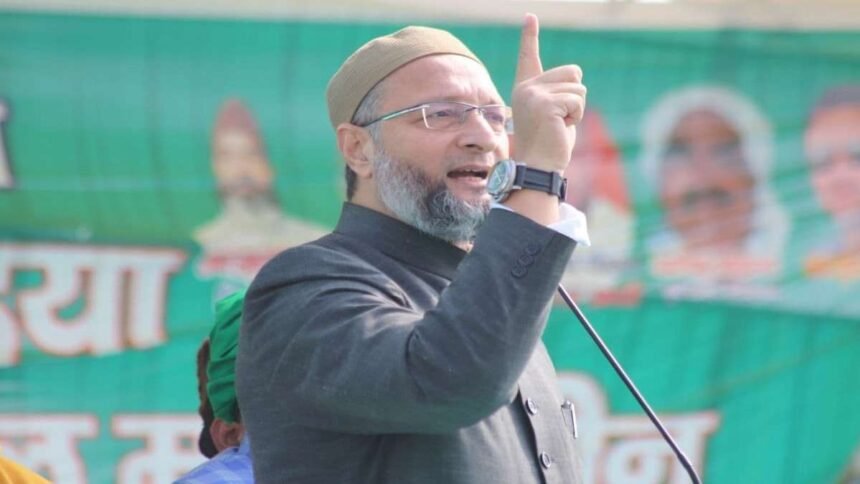Introduction
Asaduddin Owaisi’s Controversy starts from The oath-taking ceremony in the Lok Sabha took an unexpected turn when Asaduddin Owaisi, the All India Majlis-e-Ittehad-ul-Muslimeen (AIMIM) leader and Member of Parliament from Hyderabad, concluded his oath with the slogan “Jai Palestine.” This act has sparked a heated debate, primarily led by BJP leaders, questioning whether Owaisi’s actions could lead to his disqualification from Parliament.
The Controversial Oath
Asaduddin Owaisi, known for his vocal stance on minority issues and a strong critic of the BJP-led government’s policies, took his oath in Urdu, ending it with the controversial slogan that hailed Palestine. This move was met with immediate objection from BJP MPs present during the session. Leading to the Chair ordering that the remarks be expunge from the official records.
Legal and Constitutional Implications
The BJP’s response was swift and critical. BJP leader Amit Malviya, in a social media post, highlighted the possibility of Owaisi’s disqualification under Article 102 of the Constitution. According to Malviya, Owaisi’s expression of solidarity with Palestine could be construe as demonstrating adherence to a foreign state, which is a ground for disqualification as per the Constitution.
Article 102 of the Constitution outlines various grounds for disqualification as a Member of Parliament, including holding an office of profit under the government, being of unsound mind, being an undischarged insolvent, not being a citizen of India, or demonstrating allegiance or adherence to a foreign state. Moreover, The interpretation hinges on whether Owaisi’s slogan can be seen as an act of demonstrating allegiance to Palestine, thereby violating constitutional provisions.
Owaisi’s Defense and Political Context
In defense of his actions, Asaduddin Owaisi argued that there was nothing unconstitutional about his slogan. He justified it by stating that he had also uttered slogans like “Jai Bheem, Jai Telangana,” alongside “Jai Palestine,” asserting that his expressions were well within the bounds of free speech and political expression guaranteed by the Constitution.
The controversy has underscored deeper political and constitutional questions about the limits of parliamentary conduct and freedom of expression. While Owaisi’s supporters argue that his expression was a legitimate exercise of his freedom to express solidarity with global causes, critics, particularly from the BJP, argue that such expressions cross constitutional lines by demonstrating allegiance to foreign entities.
Political Reactions and Public Opinion
Union Minister G. Kishan Reddy criticized Owaisi’s actions as “absolutely wrong” and against the rules of the House. He emphasize that while living in India, Owaisi should prioritize national slogans like “Bharat Mata ki Jai,” rather than expressions that could be construed as supporting foreign states.
Asaduddin Owaisi, who has been a prominent figure in Indian politics representing Muslim interests, has often clashed with the BJP over ideological and policy issues. His party, AIMIM, has a significant influence in certain pockets of India, particularly in Hyderabad, where Owaisi has maintained a stronghold for several electoral cycles.
Conclusion
The legal implications of Owaisi’s actions remain uncertain as the matter could potentially be refer to the Lok Sabha Speaker or even challenge in courts if deemed necessary. Eventually, The interpretation of Article 102 and its application to Owaisi’s case will likely hinge on whether his slogan can be definitively categorize as demonstrating adherence to Palestine, as perceived by his critics.
This incident has once again brought to the forefront the complexities of parliamentary decorum, freedom of expression, and the constitutional provisions that govern the eligibility of MPs. It also reflects the broader geopolitical sensitivities surrounding India’s foreign policy positions, particularly in relation to the Israel-Palestine conflict.
Also Read: World Drug Day: A Global Call to Action Against Drug Abuse
In conclusion, while Asaduddin Owaisi’s “Jai Palestine” slogan has stir controversy and spark calls for his disqualification, the legal and constitutional ramifications of his actions are yet to be fully determine. The debate continues to unfold amidst political polarization, with supporters and critics presenting contrasting interpretations of parliamentary conduct and constitutional provisions.
As the situation evolves, the fate of Owaisi’s parliamentary membership hangs in the balance, awaiting further deliberation and legal scrutiny on whether his expression of solidarity with Palestine constitutes grounds for disqualification under Indian law.











